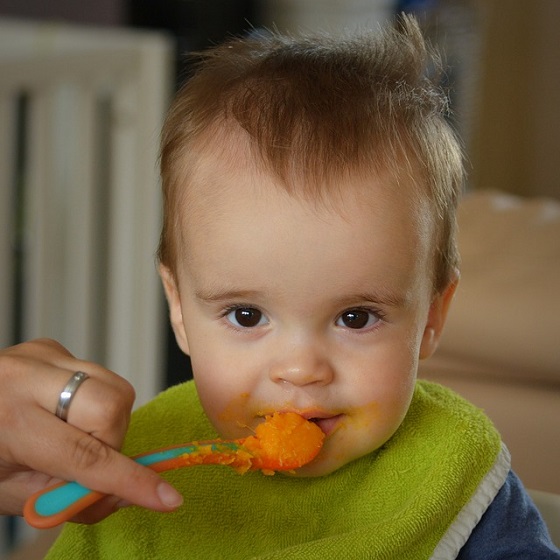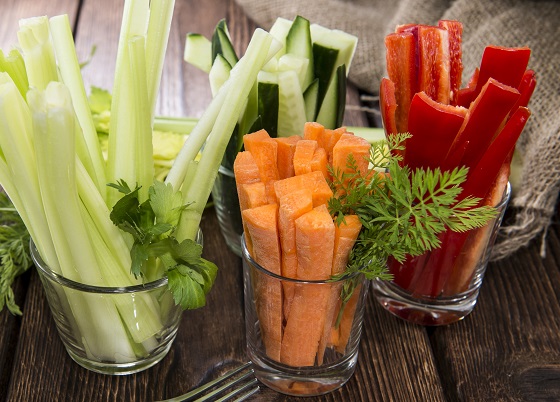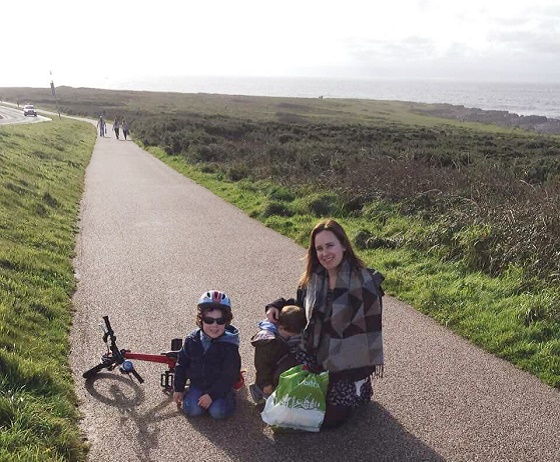Registered Nutritionist (RNutr) Lisa-Marie Huggins graduated from Newcastle University with a BSc in Food & Human Nutrition, followed by a post graduate distinction in sports nutrition. She has worked for Compass Group for over 7 years supporting our Defence and Government Services sectors and prior to that she was a nutritionist at Marks & Spencer and has spent time in various food research and product development roles. Lisa has two children, Jack aged 4 and Emilia aged 2. We caught up with Lisa over a latte (Lisa`s favourite hot beverage!) to get some expert advice to answer your top three questions on feeding babies, toddlers and young children.
Meet Our Expert

How Do I Know If My Baby Is Ready To Start Weaning?
Weaning your baby is an exciting (if not a little messy!) time that many parents look forward to. It`s a time for sensory exploration of different tastes and textures but it`s important to hold back on introducing solid foods until your baby is developmentally ready. A baby is ready to start weaning around six months of age. At this age your baby`s digestive system will have developed to move from a milk based diet to other foods.
There are three signs you need to look out for to know your baby is ready to move onto starting solid foods. Your baby should be able to:
1. Stay in a sitting position and be able to hold their head steady, and
2. Co ordinate their eyes, hands and mouth so they can pick something up and put it in their mouth without any help, and
3. Swallow the food. If your baby baby pushes the food out of their mouth (and more food ends up around their face than in their mouths!) this may be a sign that they are not quite ready yet
Every baby is an individual, but it`s very rare that a baby will be able to do all of the above before six months old. For any specific help and advice please speak with your health visitor and for more information on introducing solid food to your baby click here.
Do I Need To Give My Child Vitamin Supplements?
Children are growing rapidly so it`s really important to make sure they are eating a well-balanced diet which includes a variety of different foods to help them get all the vitamins and other nutrients they need to stay healthy, for more information click here. There are some vitamins which are recommended that we give as supplements, particularly if your child doesn`t eat a varied diet. These usually come in the form of drops and can be purchased from pharmacies or for free from your local children`s centre if you qualify for Healthy Start.
Vitamin D:
Our main source of vitamin D is from sunlight -and as there is not much sunlight during the winter months and we need to protect our children`s skin when exposed to the sun in the summer- we are recommended to give our children a daily vitamin D supplement. This is because it plays a crucial role in strengthening their growing bones and keeping them healthy!
The Department of Health recommends that:
- Babies from birth to one year of age who are being breastfed or having less than 500ml of formula milk - 8.5 to 10mcg supplement of vitamin D daily
- Babies fed infant formula milk - should not be given a vitamin D supplement until they are having less than 500ml of infant formula a day (this is because infant formula has vitamin D added to it)
- Children aged 1 to 4 years old -10mcg supplement of vitamin D daily
Vitamin A and C:
Vitamin A and C are important for young children, but if they don`t eat a varied balanced diet they may not be getting enough. Vitamin A, found in dairy foods, dark green leafy vegetables (e.g. broccoli) as well as carrots, mangoes and sweet potatoes, is important for healthy eyesight especially in dim light. Vitamin C, found in fruit and vegetables particularly oranges, kiwi fruit, tomatoes and peppers, helps the body to absorb iron. Both vitamins have a role in strengthening the immune system and maintaining healthy skin.
The Department of Health recommends: babies aged 6 months to 5 years - vitamin supplements containing vitamins A and C are recommended unless they are getting more than 500ml (about a pint) of infant formula a day.

Do You Have Any Ideas For Healthy After School Snacks?
My son Jack has just started school this year, so like any parent of a school aged child will know, they come home absolutely ravenous after a hard day of learning! To save you reaching for snacks which are high in sugar, fat or salt when you are at home- here are my top 5 quick and healthy nutrient packed snacks to help them last until dinner time:
Fruit - try chopping it up into a bowl or a container if you`re on the go- or if you are feeling fancy thread them onto a stick to create fruit kebabs! You could even serve with a yogurt to dip them into.
Nut Butter - spread on rice cakes, crumpet or roll up in wholemeal wraps (e.g. no added sugar or salt cashew, almond or peanut butter) with some chopped banana.
Vegetable Sticks and Dips - houmous or cream cheese with low salt bread, carrot, celery or pepper sticks.
Popcorn - throw some popping corn into a saucepan (don`t forget the lid!) and heat until they have popped. Weigh out 15g-20g of the cooked popcorn, sprinkle with a little bit of cinnamon, or for a savoury option some paprika for a healthy snack full of wholegrain energy! Serve with some apple slices.
No Added Sugar Banana Date and Coconut Flapjack - a favourite in my house- so easy to make up on a Sunday evening and keep in a tin ready for the week ahead. It`s also a great for lunchboxes or occasionally for a quick breakfast on the go for those mornings where your little one just DOES NOT want to get ready!!! Here's the recipe:

Ingredients:
- 80g dates, sultanas or dried apricots, chopped
- 200g ripe banana, mashed
- 1tsp vanilla extract
- 80g spread/margarine
- 50g desiccated coconut (unsweetened)
- 200g oats
Method:
- Preheat oven to 180°C (160°C fan).
- Melt the spread/margarine.
- Combine melted vegetable spread, chopped dried fruit, mashed bananas, vanilla, oats and coconut.
- Place mixture into oven proof dish (20x15cm).
- Bake for about 25 minutes until golden and firm.
The Government recommends that children should have two nutritious snacks a day, preferably fruit and vegetables - but if you are using shop bought snacks, check the nutrition information label to make sure you serve them in a 100kcal child friendly portion size (e.g. if a snack bar is 400kcal, give your child a quarter of it). To find out more click here.
Do you have any questions for Lisa, if so please contact her for free at nutrition@compass-group.co.uk
